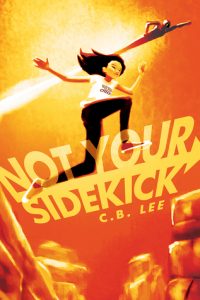Jess Tran comes from superhero parents and has an older sister with powers, but she did not inherit this gene. She decides to find her own way in a world of metahumans and superpowers and ends up at an internship working for The Mischiefs, her parents’ and the city of Andover’s nemeses. However, everything is not what it seems in the world of superpowers, heroes, and villains. With the help of her crush Abby and her friends, Jess sets out to find and reveal the truth.
One of the more refreshing aspects of the story is how Lee handles Jess’ coming out. It’s casually stated when she tells a brief story of a flashback to English class during her earlier high school years. From there, it’s simply a part of who she is and not a narrative point in which the plot revolves around.
The story deals a lot with being exceptional, and it’s weaved deftly within the world-building. In a world where metahumans were created by X29 after the Disasters, it’s easy to see why Jess feels inadequate, especially compared to her superhero parents and sister. Even though her younger brother doesn’t exhibit metahuman powers either, he’s also a child prodigy. Jess finding a way to know her value without exceptional traits makes her a protagonist to root for.
Lee’s world-building gets woven throughout the plot, which readers can appreciate. However, there are often more questions than answers to many of the details she brings up. Through Jess’s point of view, we learn about World War III, the Disasters, the creation of the North American Collective, and other similar governments around the world. But aside from a history book lesson, the reader doesn’t learn much.
An argument can be made though that this is done on purpose because it’s coming from Jess. She only knows what they’ve taught her in school, and up until now, she hadn’t questioned what she was taught. As she unfurls as a character and starts to realize the world she’s been fed is a lie, that’s when she questions the Collective, the hero/villain dichotomy, and her place in it all.
The blossoming romance between Abby and Jess is absolutely adorable. Everything from the squishy feelings of a crush to the first kiss to their comfortable jokes together creates a realistic and loveable relationship growth. There’s a scene in particular when Abby sleeps over and the tension is so well written.
Overall, a lot of plot points were obvious to the reader, though not obvious to Jess. But even so, it was a lot of fun to read. And the way it ends leaves the readers wanting more of the world, which is good because it’s the first in a series.



